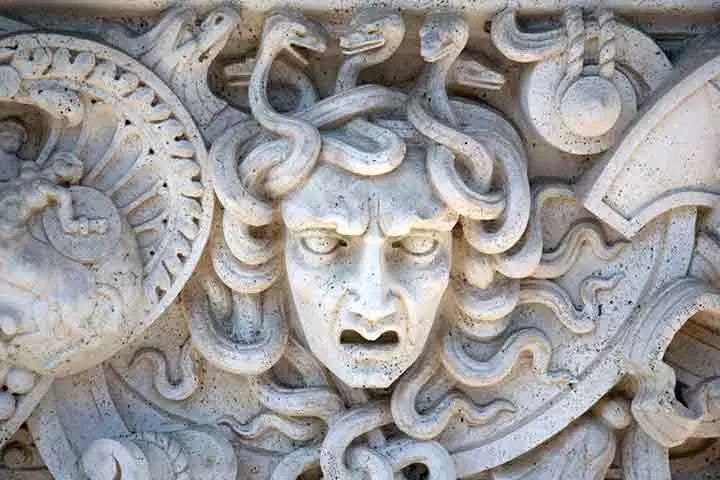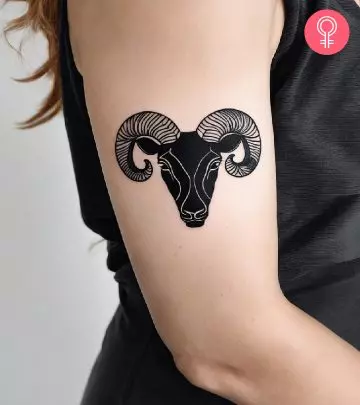Medusa Tattoo: Meaning And What It Represents
Get this interesting mythological figure inked as a symbol of your inner strength.

Image: Created with Dall·E
A Medusa tattoo is more than just ink on the skin. It holds a deeper significance and symbolism within the realm of body art. “What is a Medusa tattoo?” prompts an exploration into the meanings associated with this popular Greek mythical figure. Medusa, with her serpentine hair and petrifying gaze, captivates those individuals seeking strength, transformation, or a connection to ancient Greek mythology through their body art. In this article, we will unravel the stories and meanings behind these beautiful tattoos and more. So, let us embark on an exploration of the deeper meanings and representations embedded in the artistry of Medusa tattoos.
In This Article
The Story Of Medusa
According to Greek mythology, Medusa was once a beautiful maiden and priestess in Athena’s (Greek Goddess of wisdom and war) sacred temple. Her unparalleled and captivating beauty drew Poseidon’s (the Greek Sea God) attention, enraging Athena. In a fit of jealousy, the goddess cursed Medusa by transforming her beautiful hair into venomous snakes and granted her the ability to turn her foes into stone. Exiled to a desolate island, she became a feared monster. The Greek hero Perseus eventually slew her using a polished shield as a mirror to avoid her deadly and cold gaze. From Medusa’s severed head, Pegasus, the winged horse, and Chrysaor, a golden giant, emerged, marking the end of her tragic tale.

Learning about the rich history behind Medusa is critical to understanding the meaning associated with it today. Find out about its cultural significance in the next section.
What Does A Medusa Tattoo Mean?
A Medusa tattoo is a symbol of power, transformation, protection, and the duality of beauty and danger. The mythological Gorgon reflects the ability to face challenges and overcome adversity. A Medusa tattoo is a powerful symbol of strength, independence, feminine power, and embracing one’s inner fierceness. It represents a woman’s ability to confront and conquer challenges with resilience.
On the other hand, a Medusa tattoo may convey courage, resilience, and a connection to Greek mythology for a guy, emphasizing the strength needed to navigate life’s complexities. Ultimately, both genders find meaning in the symbol’s transformative and empowering qualities.
Michelle Kotze, a blogger, shared her personal experience of getting a Medusa tattoo. She wrote, “This tattoo, though it may seem meaningless to most, made me feel empowered. I will no longer feel like less of a women because someone else overpowered me. This tattoo is my apotropaic symbol (i).”

This artistic tattoo is symbolic of strength and independence. But is it considered to be disrespectful? Find out in the next section.
Is A Medusa Tattoo Disrespectful?
Whether a Medusa tattoo is disrespectful depends on the individual’s intention and cultural awareness. In Greek culture and mythology, Medusa is a complex and powerful figure associated with both beauty and danger. Some may see this badass tattoo as a symbol of artistic expression or personal strength. However, it is crucial to consider cultural sensitivity and the potential for misinterpretation. If worn without understanding the historical context or without regard for the potential offense it may cause, the brilliant tattoo could be perceived as disrespectful. Hence, it is essential for individuals to approach such symbols with mindfulness and respect for diverse perspectives.
A Medusa tattoo transcends a mere piece of body art, embodying profound symbolism and ancient narratives. Medusa has become a canvas for expressions of strength, personal transformation, and a connection to ancient mythology. Symbolizing the duality of beauty and danger, Medusa tattoos hold significance for both men and women, representing resilience and courage in navigating life’s challenges. While donning a Medusa tattoo is a personal choice, it is important to approach this intricate design with mindfulness and respect for diverse perspectives in the rich tapestry of body art.
Frequently Asked Questions
Why is the Medusa tattoo so popular?
The Medusa tattoo is popular for its mythological symbolism, representing strength, femininity, and the transformative power of overcoming challenges. The intricate and visually striking nature of Medusa’s serpentine locks makes it a popular choice for tattoo enthusiasts.
How much does a Medusa tattoo cost?
The cost of a snake-haired Medusa tattoo varies based on the size, complexity of the design, the artist’s experience, and location. It may approximately range from $100 to several hundred dollars or more. Consult a tattoo artist for a personalized quote based on your specific preferences and details of the tattoo design.
Key Takeaways
- Medusa was cursed by the Goddess Athena for attracting Poseidon’s attention, transforming her into a monstrous figure with snake hair and a petrifying gaze.
- A Medusa tattoo symbolizes power, transformation, independence, and resilience for both men and women.
- Individual intent and cultural awareness are important before getting a Medusa tattoo as it can symbolize personal strength or be perceived as disrespectful if worn without understanding the historical context or cultural sensitivity.
The Medusa tattoo has a rich historical and cultural significance attached to it. Check out the informative video below to explore the symbolic intricacies behind this interesting, powerful, and popular mythical figure from Greek mythology.
Personal Experience: Source
StyleCraze's articles are interwoven with authentic personal narratives that provide depth and resonance to our content. Below are the sources of the personal accounts referenced in this article.
(i). The Medusa Tattoohttps://justrealandraw.wordpress.com/2022/09/07/the-medusa-tattoo/
Read full bio of Eshna Das
Read full bio of Manjari Uppal



























